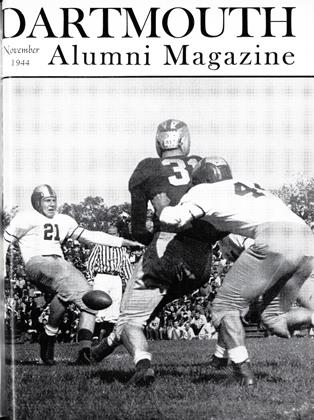HERE IS A miscellaneous selection of books which I found worth reading.
I regret that I have as yet been unable to get hold of a copy of Pertinax's TheGravediggers of France, but in the interim I found informative G. and W. Fortune's Hitler Divided France. (Macmillan, London, 1943.) It is a factual account of conditions in occupied and unoccupied France from the armistice of June 1940 up to the total occupation in November, 1942.
The authors (pseudonymous) produce a first-hand account of France under the occupation. They are sympathetic to French trials and tribulations and they even defend France's acceptance of the armistice and Petain's rule up to a point. They believe that Petain's armistice made possible our occupation, and not that of the Germans, in French North Africa.
Franz Hoellering in Furlough gives a picture of Germany after three or four years of war. It must be very much worse as I write. The story of Hans, who kills a fellow soldier and steals his furlough papers, of Leni, his sweetheart, and of the Nazi Captain Meissner reveals the utter corruption and horror of Germany under Hitler's and Himmler's rule.
Colonel Edson D. Raff has written the first story of the training and combat fighting of American paratroopers in his We Jump to Fight (Eagle Books). From Fort Benning to the North African campaign via England we follow his men, and his story makes today's headlines (the airborne invasion of Holland) all the more comprehensible. Recommended.
I was so interested in H. G. Wells' testament '42 to '44 (Seeker and Warburg, London) that I got several V-12 men to read it, too. Wells describes it as a book "upon human behavior during the crisis of the world revolution." He is a man worth listening to. He tears into the First Lord of the Admiralty for refusing to listen to new ways to trap and destroy the U-Boat; he writes of Franklin D. Roosevelt; he gives a plan for education which, if unusual, seems to me to have a great deal of merit; and he writes most frankly and candidly of men and things. This book may be difficult to locate except in a fairly large library but if you can get hold of it you won't waste your time. It takes some effort to follow Wells here, for he is not writing what Edmund Wilson recently called 5 & 10 literature.
A well-done novel about flying is Ernest K. Gann's Island in the Sky (Viking, 1944). This is the story of a pilot, with many hours to his credit, who is lost with his crew in the wilds of Labrador in the dead of winter.
David Dodge should be added to a select list of American thriller writers. His latest Bullets for the Bridegroom will glue you to your chair until you have finished.
Dilys Bennett Laing's second book of poetry Birth is Farewell (Duell, Sloan and Pearce) should be on your permanent shelf. Her "Elegy for an Engineer," well remembered, is worth the price of the book alone. Untermeyer writes.... "Dilys Bennett Laing is one of the most provocative of the younger poets because of her ability to fuse the intellectual and emotional But the vigor is more than intellectual; it is matched by a vitality of spirit which is pxobing and also passionate."
Ilya Ehrenburg's The Tempering ofRussia (Knopf) gives an excellent, though repetitious, picture of what Russia has undergone in this greatest of all wars. The human mind can scarcely grasp, or believe, the significance of the more than 800,000 pairs of shoes in the. Lublin warehouse, but reading this book will make it more comprehensible. If I were the Germans I would strew Eisenhower's path with roses. The Russians have little reason to love them. Nor do I believe they ever will.
Howard Fast's novel of the reconstruction period in the South, Freedom Road, raises a question we would like to forget, but which will bulldog us until we pay it the attention it deserves. A moving and sad tale.
 View Full Issue
View Full Issue
More From This Issue
-
 Article
ArticleEXCHANGE EDUCATION
November 1944 By JOHN H. CHIPMAN '19 -
 Article
ArticlePLANS FOR SERVICEMEN
November 1944 By WM. STUART MESSER -
 Lettter from the Editor
Lettter from the EditorLetters from Dartmouth Men in the Armed Forces
November 1944 -
 Class Notes
Class Notes1934
November 1944 By WILLIAM C. EMBRY -
 Class Notes
Class Notes1918
November 1944 By ERNEST H. EARLEY, DONALD L. BARR -
 Class Notes
Class Notes1933
November 1944 By GEORGE F. THERIAULT, LEE W. ECKELS
HERBERT F. WEST '22
-
 Article
ArticleHANOVER BROWSING
June 1935 By Herbert F. West '22 -
 Article
ArticleHanover browsing
November 1938 By HERBERT F. WEST '22 -
 Article
ArticleHanover Browsing
March 1942 By Herbert F. West '22 -
 Books
BooksSHORT CUT TO TOKYO,
October 1943 By Herbert F. West '22 -
 Article
ArticleHanover Browsing
January 1950 By HERBERT F. WEST '22 -
 Article
ArticleHanover Browsing
December 1953 By Herbert F. West '22








